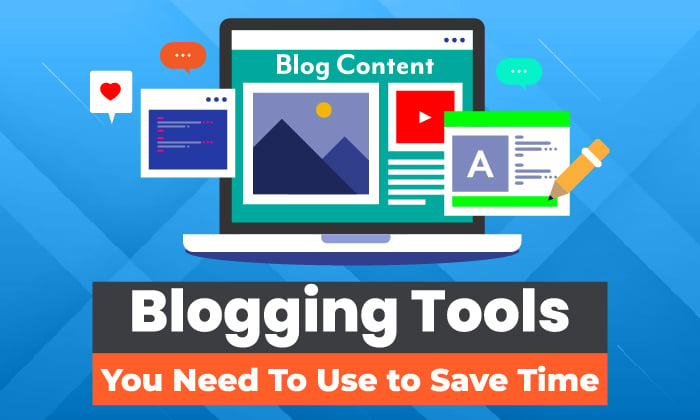
In a 2021 survey of bloggers, 77 percent of the respondents said blogging helps drive results. But what if you aren’t seeing results?
You’ve set up your blog. You’re hoping to grow your audience, create professional-looking posts, and connect with your customers.
However, there’s just one problem: managing your blog isn’t quite as easy as you imagined. It’s time-consuming enough writing a blog post. Then there’s promoting your blog on social media, researching keywords, and finding content ideas.
That’s where blogging tools are worth their weight in gold. They let you share content on social media, uncover hot new trends, and manage your content calendar effectively.
With that in mind, let’s dig into the time-saving blogging tools you need to start using today.
The Best Blogging Tools
According to Orbit Media, 53 percent of bloggers say having enough time to create and promote their content is their biggest challenge.
As a passionate blogger, if you’ve ever felt that you don’t have enough time to attend to every task on your list, maybe you just need better tools.
Blogging tools are necessary these days to work faster and land more readers and clients while producing awesome-looking posts.
Without using time-saving blogging tools like these, you end up wasting hours and struggling to create content while leaving little or no time to promote it on the search engines or social network channels.
Below, I’ve categorized some of the best tools to save time, manage content, and share it effectively.
Blogging Tools to Brainstorm Content Ideas
20 percent of bloggers say their biggest challenge is coming up with relevant topics.
Sometimes we all lack ideas, but there’s no shortage of resources to get the creativity flowing and spark inspiration for content titles.
I’m talking about blogging tools, like:
Google Trends
Google Trends is a free service from Google that details search trends. It shows how often people search a particular term and measures search-volume across various regions and languages around the world.
Since Google collects the data from consumers’ searches, you know you’re getting a true reflection of what consumers are interested in and it can help better understand their intent.
Other benefits of Google Trends are the ability to:
- discover hot topics
- identify niches
- find location-based trends for more precise targeting
On a basic level, Google Trends is simple enough to use. Just enter your search term or topic and click the “search” button.
If you want to go more in-depth, there are detailed tutorials available.
Quora
According to Quora, 300 million people use its platform to ask and answer questions.
If only there were a social media network where you could build a deeper connection and people could engage with each other on a deeper level. Just imagine how useful that would be.
Well, this network does exist. It’s called Quora.
Quora is a great tool for bloggers. It has everything you need to engage with other people and build a thriving online business.
The best part is that it’s free.
Once you know how to Quora it for marketing, you can tap into Quora’s amazing and diverse community. The next time you experience writer’s block, just log into Quora to find ideas worth spreading.
Other benefits of Quora include:
- brand discovery and blog promotion
- finding blog ideas
- reaching and understanding your target audience
HubSpot Blog Topic Generator
61 percent of bloggers say they write 2-3 drafts of a headline before finalizing it.
You can automate most things these days, and there’s good news: blog titles are no exception.
If you’re not sure how to structure your title, HubSpot’s Blog Topic Generator is a time-saving blogging tool that helps with this crucial task.
Just enter a noun to start and click “add.” You can choose up to five. Then click on the orange “give me blog ideas” button.
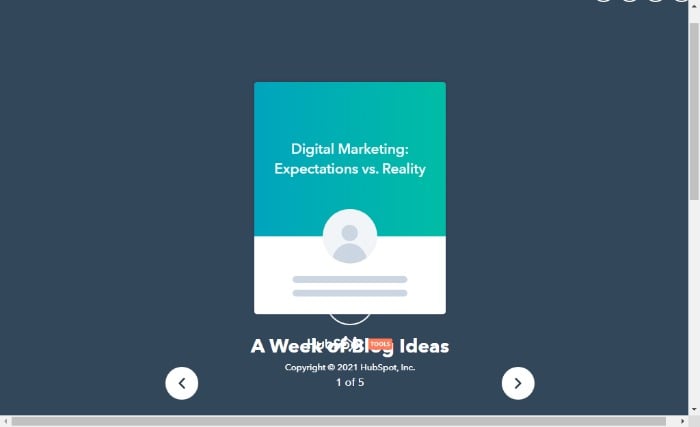
Here’s an example of what I got when entering digital marketing and email marketing:
- Digital Marketing: Expectations vs Reality
- Will Email Marketing Ever Rule The World?
- The Next Big Thing In Web Promotion
- Digital Marketing Explained in Fewer than 140 Characters
- This Weeks Top Stories in Email Marketing
Not bad, and you can always adjust or optimize titles further to suit your needs.
Other benefits of HubSpot’s blog topic generator include:
- Nobody can steal the ideas you generate with the tool.
- The tool is free!
Blogging Tools to Select Target Keywords
Only 27 percent of bloggers always do keyword research, even though they report getting better results when they do it 100 percent of the time.
Luckily there are many keyword tools available, and they shouldn’t cost your entire marketing budget. Some tools are free so a limited budget isn’t an issue. Let’s begin this section with Ubersuggest.
Ubersuggest
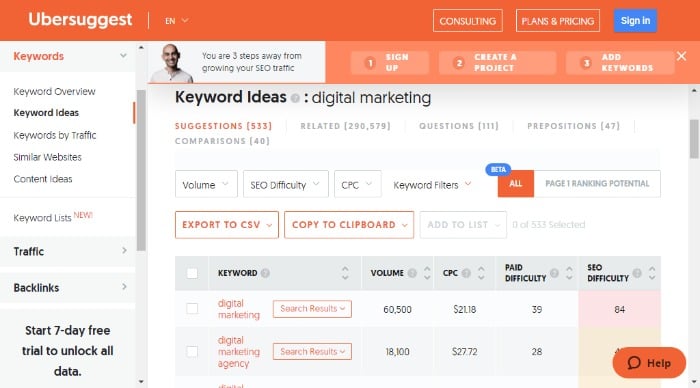
With Ubersuggest, you just enter your domain name or keyword and click “search” to get:
- keywords
- content ideas
- a keyword ranking tracker
- an SEO audit
- and more
Aside from the features detailed, there are plenty of other advantages to Ubersuggest, including:
- a simple layout, making search results easy to understand
- access to competitor analysis
- cost-effectiveness compared to other keyword blogging tools
Although it’s got some great free features, you need to subscribe to get access to the full set of data. A subscription starts at $29.99 a month with a free seven-day trial.
Semrush
30 percent of Fortune 500 companies choose Semrush.
Semrush is an SEO and PPC software that helps bloggers and content writers to analyze their competition, keywords, and industry.
It also gives you a complete breakdown of the search engine traffic with graphs and charts to help you understand your audience’s behavior.
To get to know the blogging tool better, Semrush has a knowledge base to get you started.
With Semrush, you also gain:
- access to 50 plus tools
- the ability to track your daily SERPs
- technical SEO audits
Semrush starts with a free seven-day trial. After that, it costs from $119.95 – $449.95 monthly.
Ahrefs
Nearly 11,000 new Ahrefs accounts are created each week – and for good reason.
Ahrefs offers an in-depth analysis of backlinks, competitors, and keywords, which are essential for bloggers who want to improve their blog’s performance, the number of domains linking to it, and your Google page rank.
Ahrefs provides extensive data and can allow you to better analyze key areas of your blog, like keywords while addressing issues that may be affecting your blog’s ranking.
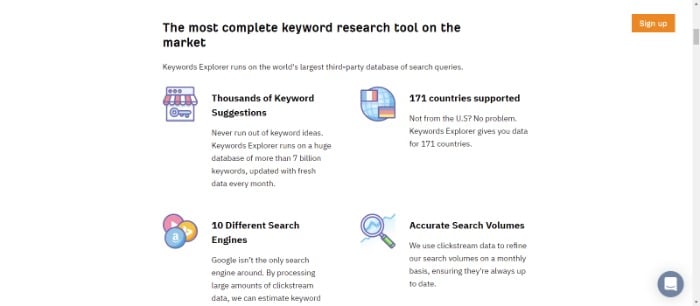
Other pros are:
- a detailed overview for seeing your results at a glance
- multiple reports, like duplicate content and performance
- an overall health score
Ahrefs offers a full set of tutorials for anyone new to the site and pricing ranges from $99 – $999 a month; features vary depending on your plan.
Blogging Tools to Organize Ideas and Create Content Calendars
It’s not just writing content that’s a challenge: it’s organizing it and having a publishing system. If your approach to content creation is somewhat chaotic, you can change that with any of the following blogging tools.
Trello
More than 2 million teams around the world use Trello to track their projects.
Trello is a time-saving blogging tool that provides a visual way of organizing projects with your team.
To get started enjoying the rich features and flexibility of Trello, you need to sign up for a free account, read through the tutorials, and you’re ready to go.
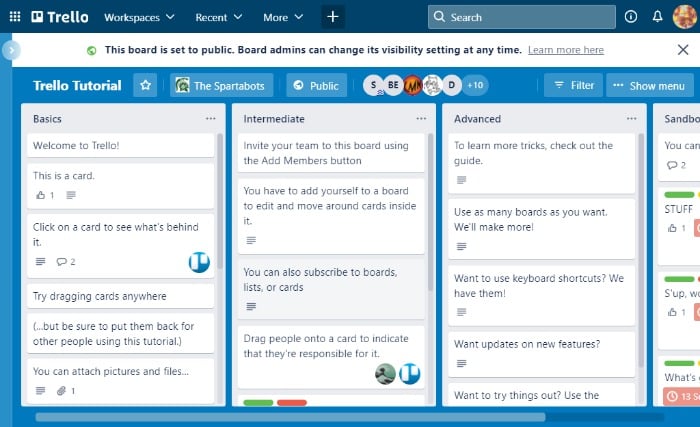
Depending on the nature of your project, you can have different lists. For example, if you work with freelance writers, you can add several new lists for posts (articles) ordered, posts in progress, posts under review, submitted posts, etc.
Other reasons to use Trello are:
- It includes pre-made templates if you aren’t sure how to organize your Trello board.
- You can see everything about your project in a single glance.
- You can collaborate with in-house and external team account-holders.
Jira
More than 65,000 companies use Jira for project management.
Jira is a software development tool for tracking and managing agile projects. It provides tools to help teams plan, track, and manage their work. In addition, you can use Jira to:
- create product roadmaps
- write user stories and assign tasks
- track progress on projects
- keep up with progress from team members
However, it has multiple other functions. Some of the main benefits of Jira are the ability to:
- create sub-tasks for breaking down larger projects
- view tasks simultaneously to track others’ progress
- add due dates, notes, and reminders for easy tracking
Jira has a free plan, and paid plans range from $7.50- $14.50 a month.
HubSpot
Over 135,000 customers in more than 120 countries use HubSpot to grow their business.
HubSpot is a marketing and sales platform that provides inbound marketing and sales solutions. It has various features like blogging tools and landing pages. It helps bloggers and marketers to generate leads with its lead capture forms and track the website’s performance with its analytics.
Additionally, it’s a powerful tool for marketers to create content and manage their inbound marketing strategy.
HubSpot blogging tools also offer:
- added SEO benefits
- a 14-day free trial
- blog analysis and management tools
Prices vary depending on the package you choose.
Some benefits of HubSpot’s marketing tool are:
- It contains marketing and data tools in a single platform—meaning you don’t have to worry about getting multiple tools and trying to get them to interact and communicate with one another.
- You can use it to host and manage videos and other media.
- It has a bot feature so you can add live chat to your site.
Google Sheets
Google’s G-Suite products, which include Google Sheets, have more than 2 billion monthly active users.
Google sheets is a web-based spreadsheet application that allows you to create and edit spreadsheets online. It comes with features such as:
- inserting charts, graphs, and images
- formatting text
- creating formulas.
However, if you’ve got content ideas to organize, Google Docs can do that, too. For example, you can:
- prioritize different projects by using filters and tables
- use Sheets as a checklist
- archive your published work
- track your word count
Benefits include:
- document collaboration
- ease of use
- accessible on a range of devices.
- instant saving of your work
Google Sheets is free as part of Google’s suite of online tools, and the product works in much the same way as other spreadsheets. To access Google Sheets, you need to set up a Google account.
Todoist
Todoist has over 187k Google reviews and an average of. 4.7 stars.
That’s because Todoist takes to-do lists to a new level. It’s an app that allows you to create multiple tasks. For example, you could create a list of blog posts, schedule them, and collaborate with other team members.
Other benefits include:
- the ability to personalize your views so it fits with your style
- simplified workflow by connecting your emails, calendars, and files
- integrations with multiple other apps, including Dropbox and Alexa
Pricing-wise, there’s a free starter package. Other tiers are $4-6 dollars monthly or $3-5 per month when paying annually.
Tools to Create Blog Images and Visuals
According to the 2021 Orbit Media survey, bloggers who use visuals get better results.
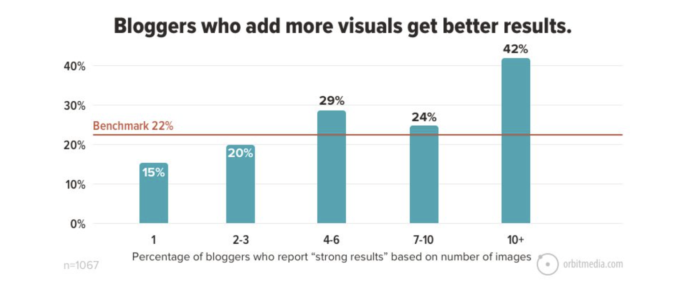
Every great blog needs eye-catching images to go with it. Fortunately, there’s no shortage of tools for creating professional-looking pictures, memes, and videos to accompany your articles and help promotion. Here are three of them.
Meme Generator
Why just stick with images when you can create shareable content like Memes? With Meme Generator, you can produce your Meme, along with other imagery.
To get started, just click the “create” link at the top of the page near the left-hand side, then choose from:
- make a Meme
- make a GIF
- make a Chart
- make a Demotivational
Then follow the step-by-step instructions.
The main benefits of this blogging tool are:
- Versatility: The Meme Generator also creates banners, posters, and other graphics.
- Customization: font colors, text, and images can be changed.
- Ease of use: easy to share via phone or on social platforms for additional promotion.
The Meme Generator is free, or you can opt for the Pro Basic tier starting at $3.49 a month.
Canva
85 percent of Fortune 500 companies use Canva, a free online graphic design tool that offers users millions of stock images, graphics, and templates.
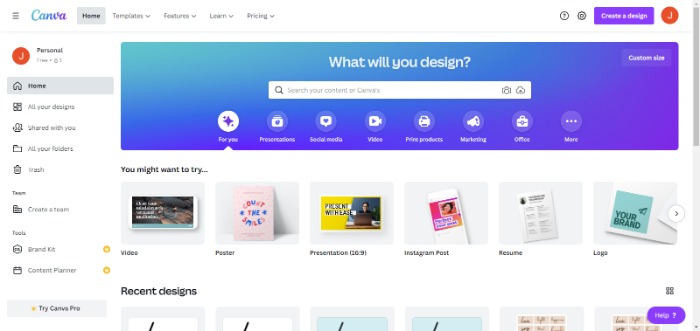
However, it’s not just for designers, and it’s popular among bloggers because of its many features.
With Canva, you can upload your photos, add text, and adjust the size and layout of your design to get the desired result.
In addition, Canva has an extensive library of templates that are free to use and customize, and there’s a design school if you need help.
Benefits include:
- You don’t need design experience.
- It’s intuitive to use. Even a beginner can find their way around Canva with ease.
- It gives you access to stock photography and customizable templates.
Canva is free, or you can upgrade to a Pro account for $12.99 a month or $119 a year.
Evernote
Evernote is a digital workspace that allows you to capture anything from text to photos to audio notes. You can also use it as a blogging tool by saving drafts of your posts in the app and then publishing them when you’re ready.
Another function of Evernote is clip images and screenshots etc., as you surf the web.
Users can open a free account, and paid upgrades are available.
Benefits are:
- It has a powerful search feature and keyword tags so you can easily find what you need to capture
- You can sync your notes with all your other devices.
Blogging Tools to Help Promote Your Content
Most bloggers (90 percent) use social media to promote their blogs.
The other top blog promotion strategies are SEO, email marketing, influencer/collaborations, and paid services.
You can use these blogging tools to decrease the time you spend promoting your blog and instead focus on other tasks that grow your traffic. Let’s begin with Flipboard.
You can use the Flipboard app to aggregate all kinds of content in one place like news, blogs, videos, photos, social media posts, etc. In fact, there are stories from nearly 30,000 topics on Flipboard.
You can then turn the aggregated content into personalized magazines to share with social media followers or your blog.
Other benefits are:
- It has an easy-to-use interface.
- Flipboard is customizable by topic interest, making it great for niche blog promotion.
Flipboard has a page of tutorials for getting started.
Make Web Video
Make Web Video is a video creation tool that enables users to create professional-quality videos in minutes.
Bloggers can use the tool to create videos for personal or professional needs, such as marketing, education, or training. Make Web Video also provides resources on making the most of their videos by including text overlays, slideshows, and animated titles.
Benefits include:
- It has drag-and-drop features which means you don’t need any technical expertise.
- It creates easy-to-share content for social media.
- It creates professional-looking, responsive videos.
Tools for Tracking Blog Analytics
Analytics helps marketers understand their audience and improve their marketing efforts. With detailed analytics, you can see which content is attracting the most click-through, reads, and insights into how they’re finding your blog.
Your analytics also give other core information like:
- visitors’ location
- bounce rate
- SERPs
Below are some details of free and paid for analytic tools.
Google Analytics
Over 28 billion live websites use Google Analytics.
Google Analytics is a free service that helps you understand your audience and improve your site’s performance.
Further, you can use the data collected by Google Analytics to improve the user experience on a site, improve conversions, and see what devices people use.
Other benefits include:
- gaining a better understanding of which content works
- better insight into customer demographics, enabling you to target your prospects more precisely
Crazy Egg
Over 300,000 websites use Crazy Egg. Crazy Egg is a web-based heatmap tool that helps you identify and fix usability problems on your website.
Additionally, Crazy Egg is a popular online tool for analyzing the user experience of your website. It also provides you with various data to help you understand how visitors interact with your content.
Other benefits include:
- Features like click tracking and analytics help deepen your knowledge of what visitors do on your blog site and how they interact with it.
- They offer an A/B testing tool.
Crazy Egg provides a 30-day trial, and monthly tiers start at $24 a month.
Blog Tools for Social Tracking
56% of bloggers rank traffic from social as their second most important traffic source.
To truly understand how well your content is working, just tracking your blog analytics isn’t enough. You need to know which social media content is getting the most traction and resonating with your audience so you can create and share more of it.
Here are some tools to help you out.
Agorapulse
Over 31,000 social media managers use Agorapulse daily.
Agorapulse is an all-in-one marketing platform for managing, monitoring, and analyzing your social media marketing campaigns. It helps you measure the impact of your marketing efforts and provides insights into what’s working and what isn’t.
In addition, with Agorapulse, you can schedule posts in advance so that you don’t miss any opportunities to engage with your followers.
Other benefits include:
- performance tracking to identify your best-performing content
- advanced scheduling to save time
- use your analytics to understand which content is getting the best response
Agorapulse offers a free 15-day trial with paid tiers starting from $79 € a month.
Buffer
Buffer has over 75k customers, and it’s easy to see why.
Buffer is a social media management tool that allows you to schedule and plan your posts on your social media platforms.
You can also track the performance of your posts and see which ones are the most popular.
Other benefits include:
- affordability
- intuitive and easy to use
- gain insights into top-performing content
There’s a free tier available. Other packages start at $5 a month.
Tailwind
Tailwind, a social media marketing tool that enables users to schedule and publish posts on Instagram and Pinterest, boasts that it’s trusted by over one billion brands and small businesses. The blogging tool helps you manage your social media marketing and grow your following.
Other benefits are:
- social monitoring tools (available with the enterprise platform)
- hashtag finder for greater visibility
- Instagram Smart.Bio link to drive traffic to your profile
Pro packages start at $9.99 a month.
Frequently Asked Questions About Blogging Tools
What tools does a blogger need?
Ideally, choosing blogging tools from each of the above sections should give you everything you need to cover all areas of your blog. This includes keyword tools such as Ubersuggest, imaging tools, and blog promotion tools like Agorapulse and Quora for blog ideas.
What are the best blogging tools for beginners?
If you’re just starting, begin with the basics. That means a free keyword tool like Ubersuggest, Google Trends for finding ideas, Canva for images, and Trello for managing content.
What are some free blogging tools?
We’ve already mentioned free blogging tools like Google Analytics and Ubersuggest, but there’s a ton more out there.
For example, Serp Robot has a built-in SEO tool that helps you track your search engine rankings. Input your keyword to see how well your blog post ranks. Then there’s Coschedule’s headline analyzer tool, Twinword for additional keyword research, and Yoast for SEO optimization in your WordPress posts.
Which blogging tools have the most features?
Different blogging tools cater to different needs. Tools like Google Analytics can give you powerful insights and tracking features to monitor your blog traffic. Ubersuggest is packed with features to get your blog ranking in search engines.
Conclusion: Blogging Tools to Save You Time
Whatever you want, there’s a blogging tool that meets your needs.
From keyword research and blogging trends to blog promotion and selecting/optimizing images, there’s a tool to help you analyze, optimize, and take your blog to the next level.
If you’re just starting and don’t want to commit too much financially, look for some of the many free blogging tools or trial memberships to help you understand your rankings and audience.
Which blogging tools do you use? Tell us below.
from Neil Patel's Digital Marketing Blog https://ift.tt/KLZxh62
via IFTTT
No comments:
Post a Comment